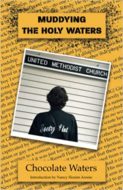 Chocolate Waters
Chocolate Waters
Muddying the Holy Waters
Eggplant Press
Reviewer: Ann Wehrman
Chocolate Waters’ Muddying the Holy Waters underscores the relevance of her unique first name, a nickname from childhood. Waters offers direct, mature poems about love and life that crack open the reader’s heart with their honesty and, ultimately, satisfy and warm like a cup of homemade hot chocolate, earnest and straight from the poet’s soul. The collection contains three sections; first, “Impossible,” poems that explore the emotional, often maddening timeline of a love affair. Next come eleven poems under the foreboding section title “Dead Animals,” and finally, “I’d Rather Be a Toad,” sixty-two pages of poems set in the poet’s hometown, Mount Joy, Pennsylvania, that muse on her family members and experiences during childhood and adolescence.
In the “Impossible” poems, Waters paints the tentative beginnings of a love affair, the sweetness of its development, and the fury and ultimate deadening of its end. Her style in this section is conversational yet minimalist; terse confessions while jogging with a friend, the poet saving air by spitting out short, piquant narratives. “First Rush,” for example, savors the sweetness of love’s beginning:
longing to
ingest you
whole or
bit by bit
your stories
joys
sadness
wanting to know your
loneliness
your truths
lies
your journey to be more
first rush
of future embraces
Then come pain and anger as the relationship breaks, as described in “You Don’t Deserve Me”:
You know you don’t
The nights I howled over your rejection
What tossing me out the window did
How little compassion you had
How oblivious to yr effect
You don’t deserve the poems I wrote for you
Not the stunning ones –
I deserve to be writing again
I should thank you for that
But I don’t want to
I wanted to write you more elegant poems
Not wrenching angry heartbroken ones
You don’t deserve me but
I do
These brief poems engage the reader immediately, expressing the universal experience of falling in love that doesn’t last. The poet crafts with rhythm: the eager quickening; then deep, passionate strokes; and finally, the sad, slow beats of the heart. Waters writes in “Gratitude,”
You let me look at my relationship
to relationship
the hopes fears anger and longing
unseen weights brought to life
Thank you for the pain made productive
for the kindness of karma resolved
Thank you for releasing this
furious heart
Loving anything or anyone is a gift, the most compelling reason for living. Human love sometimes is blessed and long-lived, but all too often, as Waters describes, it’s lessened, even destroyed, by human weakness or depravity. Nonetheless, love warrants being brought into the open where it can be understood, its goodness immortalized, and its disappointments gradually dissolved and washed away.
The second section, “Dead Animals,” begins with “Who Could Care About a Duck,” in which Waters writes, “Our pets met bad ends. Ends that were too soon; ends they didn’t deserve. I can’t remember a single one who died naturally,” and, testifying to her long journey of radical self-discovery, “I fought not to be another discarded carcass, just another dead animal.” Each poem here breaks the reader’s heart. With “DEAD ANIMAL #1: Lad,” Waters recalls:
The first animal I loved
A Collie
Luxurious coat I grabbed with my
toddler’s hands
buried my face in his fur
inhaled how delicious
he was
a little girl’s best friend
. . .
Lad was asleep under the old Studebaker
when mom ran over him
No one ever told me
where he went
Waters’ poems in this section are enhanced with black-and-white photos of the beloved pets about whom she writes, reprinted from mid-20th-century family snapshots, including one of the poet as a child outside in her stroller, bundled in winter coat and fur-trimmed hood, with the collie, Lad, resting protectively nearby.
The final and largest section of this collection, “I’d Rather Be a Toad,” chronicles Waters’ girlhood in the ironically named Mount Joy, Pennsylvania “just less than half-an-hour’s drive from Hershey.” Goodness and beauty surely exist in Mount Joy, as anywhere, but often, the misery one experiences when living in any location can be directly connected to the problems and unrest of one’s neighbors or entire community. For Waters, “Mount Joy was a curse [. . .] by its very existence. It did [her] harm by its neglect, by its unwillingness to acknowledge [her] or anyone who didn’t fit into its conservative, small town uniformity.” Waters’ poems here brim with bitter memories: her own coming out as a lesbian in the conservative small town; her parents’ cruelty, infidelity, and distance; experiences with her brothers and sister. This section is also generously supplemented with illustrative family snapshots.
Chocolate Waters has chronicled her inner life and love through writing poetry since her high school days in the late 1960s. She is also a pioneer of feminism in American, about which she reminisces, along with other personal history, in “An Impossible Introduction”: “… this brings me to the ten years I spent in Denver, 1971-1981. It was the beginning of the Second Wave and I was a part of a wonderful, exciting, turbulent time. I was a founder of the radical women’s newspaper, Big Mama Rag, one of the first and best of the era.” Today, in the 2020s, Waters carries on, writing raw, courageous poems and facing her own darkness and disappointments.
Waters confesses in the book’s final comments, “The End is the Beginning – Muddying Your Own Holy Waters,” that “Writing these autobiographical poems has not been easy – or often much fun. It has, however, been exciting, challenging, and much more difficult than I expected. In the long run it has been enlightening and freeing.” May poets everywhere persist in the compelling work of healing through writing.

